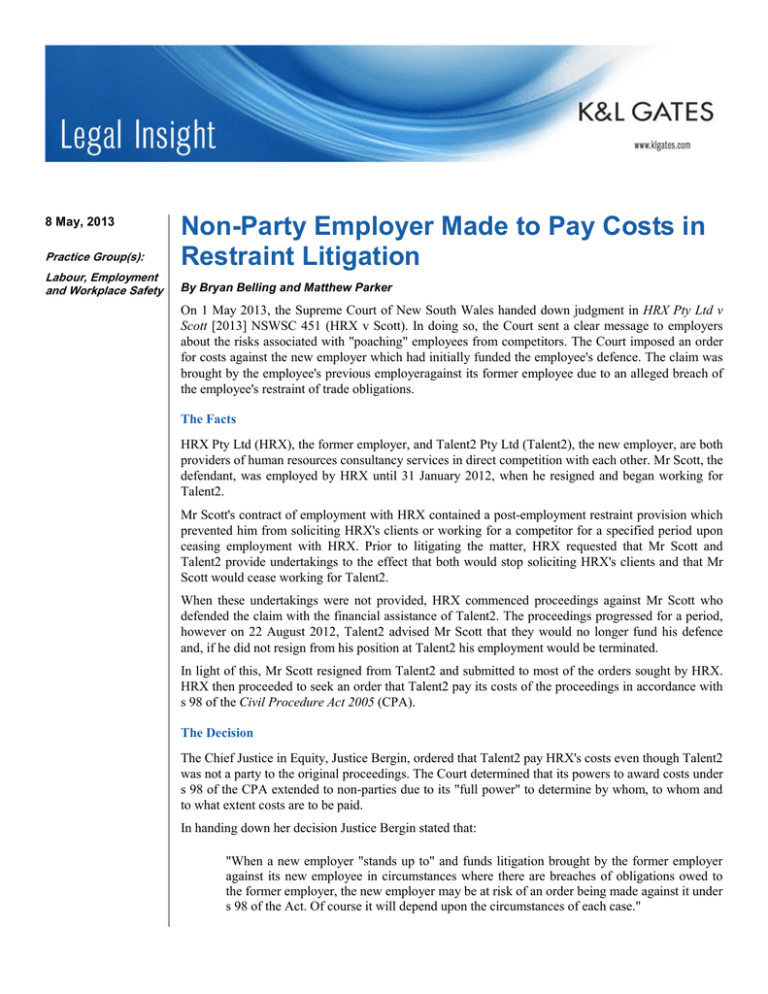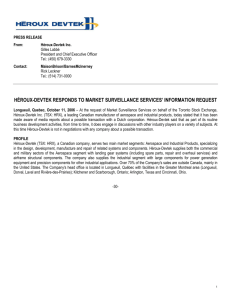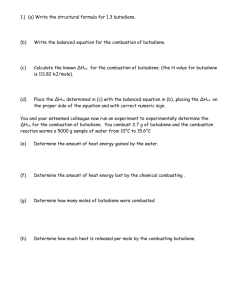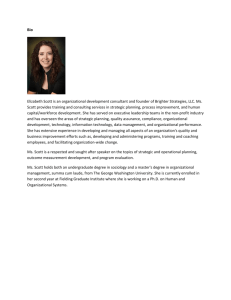
8 May, 2013
Practice Group(s):
Labour, Employment
and Workplace Safety
Non-Party Employer Made to Pay Costs in
Restraint Litigation
By Bryan Belling and Matthew Parker
On 1 May 2013, the Supreme Court of New South Wales handed down judgment in HRX Pty Ltd v
Scott [2013] NSWSC 451 (HRX v Scott). In doing so, the Court sent a clear message to employers
about the risks associated with "poaching" employees from competitors. The Court imposed an order
for costs against the new employer which had initially funded the employee's defence. The claim was
brought by the employee's previous employeragainst its former employee due to an alleged breach of
the employee's restraint of trade obligations.
The Facts
HRX Pty Ltd (HRX), the former employer, and Talent2 Pty Ltd (Talent2), the new employer, are both
providers of human resources consultancy services in direct competition with each other. Mr Scott, the
defendant, was employed by HRX until 31 January 2012, when he resigned and began working for
Talent2.
Mr Scott's contract of employment with HRX contained a post-employment restraint provision which
prevented him from soliciting HRX's clients or working for a competitor for a specified period upon
ceasing employment with HRX. Prior to litigating the matter, HRX requested that Mr Scott and
Talent2 provide undertakings to the effect that both would stop soliciting HRX's clients and that Mr
Scott would cease working for Talent2.
When these undertakings were not provided, HRX commenced proceedings against Mr Scott who
defended the claim with the financial assistance of Talent2. The proceedings progressed for a period,
however on 22 August 2012, Talent2 advised Mr Scott that they would no longer fund his defence
and, if he did not resign from his position at Talent2 his employment would be terminated.
In light of this, Mr Scott resigned from Talent2 and submitted to most of the orders sought by HRX.
HRX then proceeded to seek an order that Talent2 pay its costs of the proceedings in accordance with
s 98 of the Civil Procedure Act 2005 (CPA).
The Decision
The Chief Justice in Equity, Justice Bergin, ordered that Talent2 pay HRX's costs even though Talent2
was not a party to the original proceedings. The Court determined that its powers to award costs under
s 98 of the CPA extended to non-parties due to its "full power" to determine by whom, to whom and
to what extent costs are to be paid.
In handing down her decision Justice Bergin stated that:
"When a new employer "stands up to" and funds litigation brought by the former employer
against its new employee in circumstances where there are breaches of obligations owed to
the former employer, the new employer may be at risk of an order being made against it under
s 98 of the Act. Of course it will depend upon the circumstances of each case."
The Court determined that without the funding from Talent2, the litigation would not have proceeded
and Talent2 was in a position where it would have benefited from the employee's successful litigation
as it would have retained an experienced employee in a competitive market.
Implications for Corporations
The decision in HRX v Scott provides an important lesson for corporations aiming to recruit the
employees of its competitors. Justice Bergin stated that:
"It is incumbent upon employers who effectively poach their competitors' employees to
ensure that those employees are not acting in breach of their obligations to their former
employers, particularly where the consequence of such breach is a benefit to the new
employer."
By ignoring a new employee's obligations to their previous employer, a corporation puts itself at
significant risk even in circumstances where litigation isn't commenced directly against it.
Authors:
Bryan Belling
bryan.belling @klgates.com
+61.2.9513.2541
Matthew Parker
matthew.parker@klgates.com
+61.2.9513.2491
Anchorage Austin Beijing Berlin Boston Brisbane Brussels Charleston Charlotte Chicago Dallas Doha Dubai Fort Worth Frankfurt
Harrisburg Hong Kong Houston London Los Angeles Melbourne Miami Milan Moscow Newark New York Orange County Palo Alto Paris
Perth Pittsburgh Portland Raleigh Research Triangle Park San Diego San Francisco São Paulo Seattle Seoul Shanghai Singapore Spokane
Sydney Taipei Tokyo Warsaw Washington, D.C. Wilmington
K&L Gates practices out of 48 fully integrated offices located in the United States, Asia, Australia, Europe, the
Middle East and South America and represents leading global corporations, growth and middle-market companies,
capital markets participants and entrepreneurs in every major industry group as well as public sector entities,
educational institutions, philanthropic organizations and individuals. For more information about K&L Gates or its
locations, practices and registrations, visit www.klgates.com.
This publication is for informational purposes and does not contain or convey legal advice. The information herein should not be used or relied upon in
regard to any particular facts or circumstances without first consulting a lawyer.
© 2013 K&L Gates LLP. All Rights Reserved.
2






